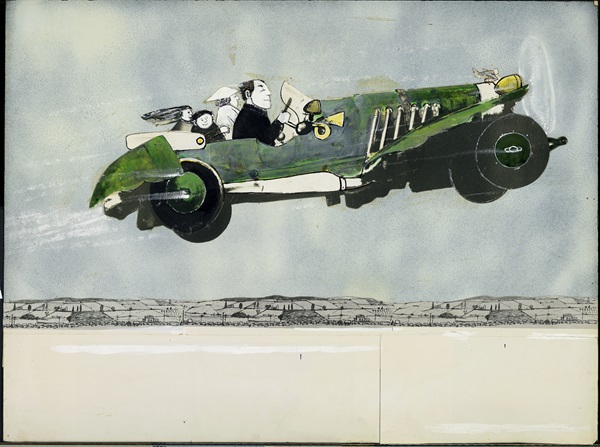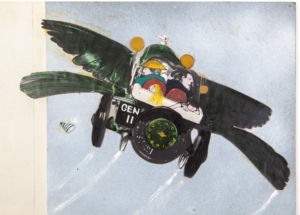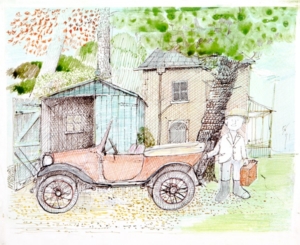
The Road to Success
Damian Kelleher tracks John Burningham’s love affair with the motor car.
 This year marks the 60th anniversary of a true children’s classic. Chitty Chitty Bang Bang was written by Ian Fleming for his son Caspar and first published back in 1964 with original illustrations by John Burningham. It was published just after the Bond creator’s death, at the height of his popularity, the only children’s book that Fleming would ever write (although it is reported he had plans for further Chitty Chitty Bang Bang adventures). The story was issued in three volumes and earned a special place in children’s literature, assisted by an iconic musical movie released in 1968, with a screenplay co-written by Roald Dahl.
This year marks the 60th anniversary of a true children’s classic. Chitty Chitty Bang Bang was written by Ian Fleming for his son Caspar and first published back in 1964 with original illustrations by John Burningham. It was published just after the Bond creator’s death, at the height of his popularity, the only children’s book that Fleming would ever write (although it is reported he had plans for further Chitty Chitty Bang Bang adventures). The story was issued in three volumes and earned a special place in children’s literature, assisted by an iconic musical movie released in 1968, with a screenplay co-written by Roald Dahl.
For John Burningham, it was something of a dream job and a lucky break, all rolled into one. His spirit of adventure and fascination for all things moving can be traced back to his childhood, some of which was spent living in a caravan in the countryside. John’s parents sent him to a succession of boarding schools, and rented out their own home in Farnham to pay the fees. ‘For a small child, living in a caravan is wonderful,’ he said. ‘It was the real countryside, paradise for children, but hard on my parents.’
 It was at this time that his concept of freedom become inextricably linked with the open road – and his fascination with the vehicles that powered their way through. Fleming’s fantasy adventure about a magical car with a mind of its own was based on a real car that he had seen as a boy; Louis Zborowski’s famous monster motor of the 1920s. A keen amateur racing driver, millionaire playboy Zborowski had indulged his passion for racing by building a powerful 23-litre ‘super car’ with the help of engineer and fellow racing driver Clive Gallop with an engine that had once belonged in a Zeppelin. It drew huge crowds when Zborowski raced it as Brooklands in the 1920s, and Fleming had never forgotten it.
It was at this time that his concept of freedom become inextricably linked with the open road – and his fascination with the vehicles that powered their way through. Fleming’s fantasy adventure about a magical car with a mind of its own was based on a real car that he had seen as a boy; Louis Zborowski’s famous monster motor of the 1920s. A keen amateur racing driver, millionaire playboy Zborowski had indulged his passion for racing by building a powerful 23-litre ‘super car’ with the help of engineer and fellow racing driver Clive Gallop with an engine that had once belonged in a Zeppelin. It drew huge crowds when Zborowski raced it as Brooklands in the 1920s, and Fleming had never forgotten it.
After a succession of schools, John Burningham worked on farms, forests and school building sites across Europe – as a Conscientious Objector, he’d been part of the Quaker Friends’ Ambulance Unit during the war – before taking up a place at The Central School of Art and graduating with distinction. It was Harold Hutchinson, London Transport’s Head of Publicity who picked up on John’s potential. Hutchinson had a reputation for talent spotting, and had given early breaks to promising young artists such as Abram Games and Tom Eckersley. With his fascination for vehicles, John was a perfect choice for London Transport. Please Avoid the Rush Hours, a panel poster by Burningham, for display above seats on tube trains and buses, made its debut in 1961. Much of Burningham’s work was designed to encourage Londoners to get out and about, highlighting some of LT’s free manuals (such as A Day on the River, 1965) that were widely available at the time.
Already the strong link to narrative storytelling was evident. John’s first children’s book Borka was published in 1963, and won the prestigious Kate Greenaway Medal. It was then that its publisher Tom Maschler, asked Burningham to provide the illustrations for Fleming’s magical car story. ‘I decided that the best way of approaching it was to make a model of the car and photograph it,’ Burningham said. ‘The art is a combination of photography and illustration. That was quite adventurous in 1963.’
It wasn’t just an understanding of cars and how they work that imbued John’s illustrations for Chitty Chitty Bang Bang, but a mutual admiration for the spirit of the book that powers through so much of Burningham’s own later work. “Never say ‘no’ to adventures. Always say ‘yes’, otherwise you’ll lead a very dull life” says Commander Caractacus Pott, the hero of the story.
 It was advice that John Burningham’s characters certainly took on board when they set off on their own adventures. Take Mr Gumpy, for
It was advice that John Burningham’s characters certainly took on board when they set off on their own adventures. Take Mr Gumpy, for  instance. The classic Mr Gumpy’s Motor Car begins with an ordinary character in a familiar setting. The text tells us ‘Mr Gumpy was going for a ride in his car.’ But this is merely the starting point for a raucous day out in a car packed with passengers – a rabbit, a cat, a dog, a pig, a sheep, some chickens, a calf, a goat and of course, a couple of squabbling children. It’s a beautiful red vintage convertible, perfect for a drive across a country field on a sunny afternoon, but not so idyllic when the heavens open and the car becomes bogged down in the mud. There’s a lot of car trouble that crops up in John’s work, but he brings his own ‘can do’ attitude towards these setbacks and they are soon back on the road and heading for home.
instance. The classic Mr Gumpy’s Motor Car begins with an ordinary character in a familiar setting. The text tells us ‘Mr Gumpy was going for a ride in his car.’ But this is merely the starting point for a raucous day out in a car packed with passengers – a rabbit, a cat, a dog, a pig, a sheep, some chickens, a calf, a goat and of course, a couple of squabbling children. It’s a beautiful red vintage convertible, perfect for a drive across a country field on a sunny afternoon, but not so idyllic when the heavens open and the car becomes bogged down in the mud. There’s a lot of car trouble that crops up in John’s work, but he brings his own ‘can do’ attitude towards these setbacks and they are soon back on the road and heading for home.
No doubt John’s own experience of driving through Europe and Israel on a Vespa in the early 60s provided plenty of practical problem-solving. It’s this positivity that steers Father Christmas through his long and disaster-tinged journey to the top of the Roly Poly Mountain in Harvey Slumfenburger’s Christmas Present. Despite the havoc that snow and ice cause all the vehicles Father Christmas manages to commandeer, it’s his grit and sheer determination to deliver Harvey’s present that will triumph in the end. On the final page, Burningham teases us by not revealing what Harvey has received. But by now, as we all know, this is classic John Burningham; it’s up to you to decide. After all, it’s not the destination that ultimately matters – it’s the thrill of the ride that really counts.
Damian Kelleher is a writer and journalist specialising in children’s books.
Borka, John Burningham, Red Fox, 978-0099400677, £7.99 pbk
Mr Gumpy’s Motor Car, John Burningham, Red Fox, 978-0099417958, £7.99 pbk
Harvey Slumfenburger’s Christmas Present, John Burningham, Red Fox, 978-1844288335, £7.99 pbk




